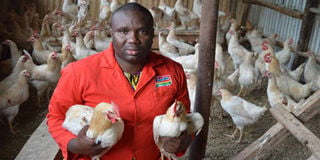With Leghorn, I count my chicks before they hatch

Poultry farmer, Michael Mwangi attends to his leghorn birds in Kimilili Town, Bungoma. White leghorn breed matures faster and the birds are hardy and give big eggs. PHOTO | ISAAC WALE | NATION MEDIA GROUP
What you need to know:
- Stuntedness in birds is mainly caused by inadequate nutrition and stress.
- White leghorn breed matures faster, the birds are hardy and give big eggs.
- Vaccinate the chicks against Gumboro at day 10, Newcastle at day 20 and 30.
- The ingredients used in feed formulation may not be balanced.
Kimilili in Bungoma County is a popular trading centre, and on any day, you will find it bustling with activity.
In the town centre, just adjacent to Riziki supermarket, we meet Michael Ngugi, a poultry farmer who has 962 birds of the White Leghorn breed hosted in two structures made of iron sheets.
“I keep both hens and roosters in different structures. Currently, I have 480 cockerels and 482 hens,” says Ngugi as he takes us around his Le Coq East Africa farm.
He started the business in 2016 with 500 Improved Kari Kienyeji day-old chicks bought at Sh100 each.
“I then bought 20 bags of 50kg commercial feeds at Sh2,400 each for the birds for a start,” says Ngugi, who quit a banking job in Kisii after working for two years to help his father run the family supermarket before he later ventured into poultry.
He pumped into the business Sh2m, a loan from the family with Sh700,000 being used to purchase land and the rest going on two milling machines worth Sh150,000 and setting up two poultry structures worth Sh200,000. The business picked up well.
“I was collecting 15 trays of eggs that I sold at the supermarket and traders at Sh300 per tray,” he says.
However, the farmer sold his first batch of the 500 birds that he started with last December at Sh700 each to traders as he shifted to the Leghorn birds.
“White leghorn breed matures faster, the birds are hardy and give big eggs. I start selling them at four months and they have a good feed-to-egg conversion ratio,” he offers, noting he bought the chicks from Kenchic Kisumu.
The farmer feeds the birds early morning and cleans and fills the drinkers.
“We give them our own formulated feeds and water at 7am, noon, 2pm and 4pm,” says Ngugi, who has two workers who help him do the work.
INADEQUATE NUTRITION AND STRESS
He makes the feeds from maize germ sourced from Webuye Grain Millers, soy beans, sunflower, omena (fishmeal), lime, salt and maize cobs that he mills.
Ngugi started formulating the poultry feeds after attending a four-day poultry nutrition training at Egerton University in August last week.
“In a day, the birds consume 20kg of the formulated feeds. I also sell surplus feeds to farmers at Sh400 per 10kg bag,” says Ngugi, who notes he was inspired to get into poultry after reading the story of Nelson Muguku of the Muguku Poultry in Kiambu.
Ngugi, who is currently selling the cockerels at Sh800, advises that for a good venture in poultry, once should adhere to the vaccination schedule.
“Vaccinate the chicks against Gumboro at day 10, Newcastle at day 20 and 30. Then the chicks should be kept in the brooder to keep them warm and the birds dewormed every three months,” he says.
Still, this may not stop the diseases completely as one of his biggest challenges is Wry neck or Torticollis disease and Ranting-stunting syndrome.
“This year I bought 1,000 birds but lost 38 chicks to Torticollis. The birds had twisted necks and I have 40 birds with stunted growth,” he says.
Amos Amenya, an agronomist at the Lake Basin Development Authority, says stunted growth is caused by inadequate nutrition and stress.
“The ingredients used in feed formulation may not be balanced. Sometimes the birds are overcrowded such that others don’t get enough food resulting to stunted growth,” explains Amenya.
He advises farmers to add foods rich in Vitamin E such wheat bran and pollard into the feed formulation.
In the next five years, Ngugi plans to run a full value chain poultry business, engaging in hatchery, keeping 10,000 birds and selling animal feeds.




